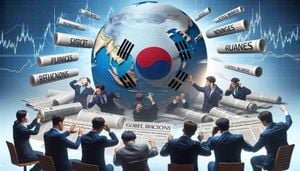Donald Trump has returned to the political stage following his inauguration as the 47th President of the United States on January 20, 2025, with actions and statements indicating he intends to solidify his vision of American dominance on the world stage. Trump's path as president has not only been defined by his controversial reign before but is now characterized by assertive executive orders and strong rhetoric aimed at reinforcing his administration's stance on various issues.
On the first day of his presidency, Trump signed several executive orders, marking the occasion with significant fanfare at the Capital One Arena, where his supporters gathered to celebrate. This departure from tradition, as he signed his first orders outside the Oval Office, symbolizes the unorthodox approach he embraces as he transitions back to leadership. Historically, incoming presidents typically conduct such affairs within the confines of the White House.
Among the first measures undertaken by the new administration was the repeal of 78 executive actions put forth by former President Joe Biden. Indeed, Trump's aggressive rollback of regulations was evident as he sought to highlight his commitment to his base, which is characterized by skepticism toward the establishment and international organizations. He has consistently framed these actions as necessary for the protection of American citizens and interests.
Amongst the key executive orders was Trump's directive to exit the Paris Agreement on climate change — marking another chapter in his contentious relationship with international environmental efforts. This decision reflects his long-held belief, articulated during his previous presidency, where he often advocated for U.S. energy independence and prioritization of domestic production over global agreements.
Trump stated, “Today I declare a national energy crisis. We will drill, drill, drill! America will again become an industrial power with our vast reserves of oil and gas,” illustrating his administration's focus on fossil fuels rather than renewables. This clear pivot suggests the administration will prioritize economic benefits over the climate agenda supported by many of the United States' global allies.
Compounding the divide between Trump's administration and established international norms, he expressed readiness to support the acquisition of TikTok's U.S. assets by major business figures, such as Elon Musk or Larry Ellison. This willingness to align strategic technology purchasing with figures who share his political beliefs suggests Trump's intention to reshape U.S. business and social media landscapes not just on American terms, but also significantly influenced by personal loyalties and affiliations.
Trump's first day also proved noteworthy for the area of immigration, as he declared a state of emergency at the southern U.S. border to address what he called the "influx" of illegal immigrants—a key talking point during both his previous campaigns and this one. This proactive stance signals his intent to reignite the national debate around immigration. Points he raised echo sentiments from his first term, emphasizing themes of security and national sovereignty.
Adding fuel to the fire of political divisions, Trump touched upon LGBTQ+ rights by signing orders restricting federal recognition of non-binary gender identities, reinforcing traditional gender definitions within government policies. This move aligns directly with the views of his conservative base yet raises concern from advocacy groups who worry about the ramifications for transgender and non-binary individuals.
These actions did not go unnoticed. Political analysts stress the significance of Trump's pivot to more hardline positions on issues such as immigration and gender, positing this as evidence of his commitment to what has often been termed the "culture wars." Craig Sapershtein, partner at Pillsbury, noted, “These cultural issues will take center stage early on, indicating how the new Congress will respond to Trump’s directives.”
Interestingly, Trump's decision-making style continues to reflect his past. Observers highlight his penchant for direct negotiation tactics devoid of ideological baggage, drawing attention to his approach to foreign relations. His desire to stabilize the U.S. stance globally stems from his foundational perspective of prioritizing American interests above all else. Unlike his predecessors, who engaged extensively with the concept of global responsibility, Trump's actions delineate boundaries focused primarily on economic legality.
A significant portion of his advisory team has been characterized by loyalty and conformity to his worldview, which analysts indicate could lead to renewed tensions with traditional allies like NATO as he aggressively pursues bilateral agreements over multilateral frameworks. His inclination to utilize economic terms to assess international relations diverges from practices where strategies were steeped more heavily in political ideology or collective security principles.
Building onto his narrative, Trump has shared personal moments including correspondence from Biden, encapsulating political discourse within the White House. The letter conveyed well-wishes and highlighted the potential for bipartisanship, depicting Biden’s hope for the nation’s stability. Trump described the letter as "inspiring," though juxtaposed with his current agenda, this suggests he continues to chart his own course as opposed to embracing cooperative governance.
With potential crises on the horizon—from handling international diplomacy over Ukraine to addressing domestic political unrest—Trump's leadership strategies will be closely monitored. His early days are framed as attempts to unify his party and align strategies among Republican leaders, though the challenges presented by opposition factions threaten to complicate these efforts.
While Trump tentatively grips the reins of power, the broader stakes associated with his presidency persist. Emerging questions linger around whether his approach will lead to sustainable governance or ignite political chaos as pundits anticipate turbulent years. Time will reveal whether Trump will invigorate the American economy under his vision or exacerbate divisions within the country.



